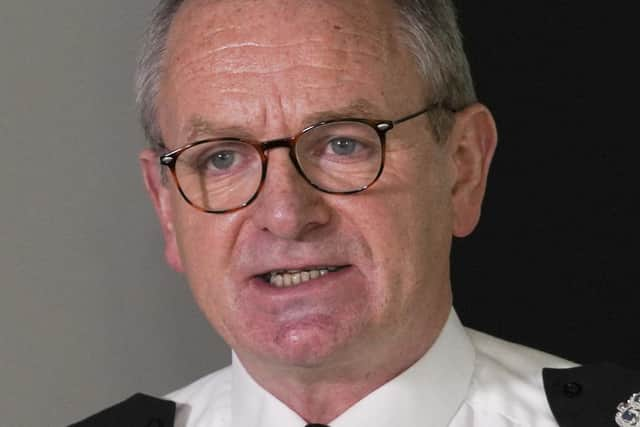Scottish spending review: Police Scotland chief warns officer numbers may have to be cut
Chief constable Sir Iain Livingstone warned plans to introduce new technology and create a fleet of electric vehicles could also suffer as he voiced his disappointment at the funding allocation, saying policing is not a “priority” for ministers.
Speaking at a meeting of the Scottish Police Authority (SPA) on Thursday, Sir Iain claimed that over the next five years, Police Scotland would see a real terms cut in its budget of around £66 million.
Advertisement
Hide AdAdvertisement
Hide Ad

He said: “In March we described the gap between expected capital funding and our necessary requirements.
“Anticipated capital funding for the next five years is £26m less than required for our fleet, £20m less than required for our estate, and £20m less than is required for our digital division as we seek to digitalise policing.
“The position is not the revenue protection that we expected and that high cost-of-living crisis has the potential to increase the vulnerability of people while at the same time increasing pressure on the services which exist to support them.”
Sir Iain warned that public services, including the police, would face “difficult and exhausting” choices in coming years about where to allocate funding.
He warned this could lead to a situation of “disharmony”, adding: “It places additional strain across society and such pressures have the potential to lead to disruption, protest, disharmony.
“But, of course, policing as a public service will clearly be subject to especially high inflation and real-term increases in our operating costs. These increased costs will not be matched by increases to our funding in the absence of real-time revenue protection as laid out in a spending review.”
Martyn Evans, the SPA chair on the Scottish Government spending review, said the force's "multi-year revenue and capital plans have been thrown into disarray".
Calum Steele, general secretary of the Scottish Police Federation (SPF), insisted it was "entirely obvious" the proposed cuts in the spending review would lead to a reduction in officers.
Advertisement
Hide AdAdvertisement
Hide AdThe SPF, which represents frontline officers, has rejected a £565 annual pay increase and threatened "costly and disruptive" action.
Mr Steele said possible measures will be communicated to members by the end of next week.
Sir Iain also argued pay awards for officers should be fair and affordable, adding: “Officers and staff work incredibly hard to serve their fellow citizens and deserve fair recompense given the unique position the unique challenges and demands placed upon them and the sacrifices that come from being a holder of the office of constable.
“It is important officers and staff are rewarded fairly, particularly with their own household expenses are rising.
“I remain committed to seeking a pay settlement going through the police negotiating board. And we will continue to work with the Scottish Government to achieve this.”
A Scottish Government spokesperson said: “The resource spending review sets out the Scottish Government’s high-level resource spending plans for future Budgets, providing a basis for financial planning. The resource spending review is not a budget – future Scottish Budgets will be presented to the Parliament for scrutiny and a formal vote each year.
“The police resource budget has been protected in real terms since 2016/17, which led to the elimination of the police budget deficit. We remain committed to working closely with both SPA and Police Scotland to ensure we continue to have a safe, protected and resilient Scotland.”
Finance secretary Kate Forbes had previously warned the public sector needed to “re-shape and re-focus” in coming years after unveiling spending plans that will slash more than £1 billion from key areas, including councils and the police
